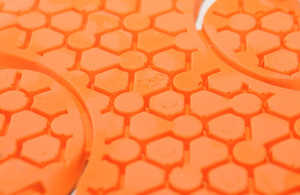Smart materials sought by MOD for UK defence and security
Smart materials to extend the life of a vehicle or textiles which incorporate electronics are among the ideas being sought by the Ministry of Defence.

A highly magnified examination of 'D30' - a smart substance that hardens on impact (library image) [Picture: Crown copyright]
The Materials and Structures Science and Technology Centre (MAST STC), established by the Defence Science and Technology Laboratory (Dstl), has launched a call for research proposals in this area. It places a high priority on the impact that novel materials and technologies can have on defence.
The call for innovative ideas was launched on Thursday 21 February by Dstl’s Centre for Defence Enterprise (CDE), recognising that technical advancements in the ability to engineer micro- and nano-materials and structures means it is becoming increasingly possible to model, design and construct materials with unique properties.
Materials that exhibit ‘smart behaviour’ are categorised as those that have properties that can be significantly changed in a controlled fashion by external stimuli.
Potential suppliers should consider the wide range of platform types, structures, equipment and devices used by the military, including futuristic nano-unmanned vehicles, large ships, land vehicles and aircraft. Structures range from tents to large deployable operating bases, as well as headquarters, and equipment types range from radios to weapons to clothing.
CDE focuses on novel and innovative research in support of planning for an agile future military capability. It is seeking disruptive technologies that can have a significant impact on operational capability with the desire for revolution rather than evolution.
Professor Ian Youngs, Technical Lead for the MAST STC, says:
It is vital for the success of MOD’s materials and structures technology programme to solicit high quality and innovative studies through CDE in order to provide technical challenge to the core research programme. Smart materials represent a dynamic field of research and provide many opportunities to integrate added functionality to future military equipment concepts.
Research interests include the following areas, although this is not an exhaustive list:
-
smart coatings, such as those which indicate whether a structure has exceeded an operating parameter (for example, a pressure or temperature limit) or sustained critical impact damage, could provide evidence necessary to initiate maintenance or repair
-
smart textiles - with the potential to fully encapsulate integrated functionality within the fibres of textile yarns to provide a robust, inexpensive, flexible platform for a host of enhanced capabilities
-
smart packaging - providing opportunities for better understanding of the logistic supply chain which could provide essential information required to understand the long-term storage histories of military equipment
-
intelligent systems - offering future potential for defence and security applications by embedding intelligent sensing, information processing, communication and other functionality within components and structures
-
adaptive (morphing) structures - offering significant benefit to a number of military platforms; for air platforms, for example, the removal of conventional flight control surfaces can provide a dramatic improvement in electromagnetic signature or offer increased endurance through weight-savings
-
advanced manufacturing - looking at whether emerging manufacturing tools can be used to produce highly complex multifunctional materials with new and unique capabilities
-
modelling - the complex behaviour that emerges from a new generation of engineered materials with highly coupled multifunctional properties is of interest in terms of predicting, optimising and ultimately understanding the relevance of these materials or systems in a defence and security context
The call for proposals will close on Friday 12 April at 5:00pm. All proposals must be submitted via the CDE online portal. This call will also be supported by a web seminar on Thursday 14 March.